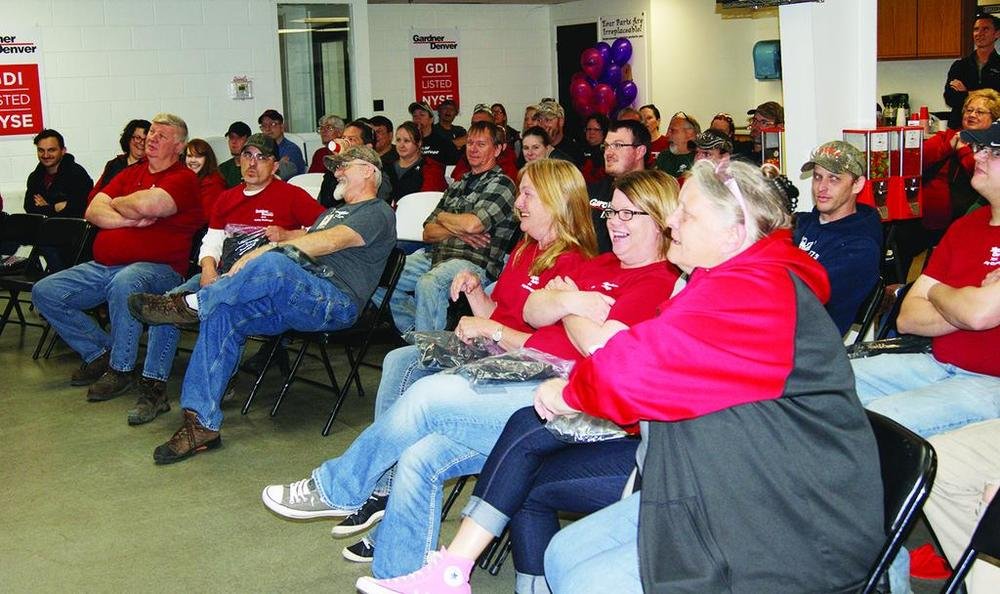Sharing wealth with hourly employees has not been a major part of the private-equity playbook, which has more often called for layoffs, plant closings and large helpings of debt.
But at least in its industrial manufacturing portfolio, the private-equity firm KKR has distributed about a half-billion dollars in dividends and other proceeds to about 20,000 hourly employees of eight companies making products like pumps and compressors, garage doors and safety harnesses.
“The thing we’ve gotten really right is making everyone in the business an owner, down to the most junior levels of the organization,” KKR’s Pete Stavros tells me in the latest episode of ImpactAlpha’s Agents of Impact podcast. “We’ve seen employee engagement improve at that hourly workforce level. Retention goes up. And investment returns have been really strong.”
Stavros is co-head of KKR’s U.S. private-equity business which is investing its $14 billion 12th fund. The U.S. funds are managed separately from KKR’s global funds, including the firm’s $1 billion Global Impact Fund.
The employee-ownership strategy for the manufacturing sector covers only a small portion of the portfolio. Stavros said the firm’s $4 billion investment in the eight companies since 2011 is now valued at $12 billion. “So we’ve created a very nice gain, and employees have participated in that.”
To be sure, manufacturing may represent a special case. KKR, like other private-equity giants, has made headlines for leveraged buyouts and other deals that have not worked out as well for employees. Under pressure, KKR, along with Bain Capital, established a $20 million fund for employees of Toys ‘R Us who were displaced after the toy store chain declared bankruptcy in 2018.
More so than in retail, Stavros says the engagement and motivation of hourly employees in manufacturing is crucial to companies’ performance. The sector has a rocky record, but between global supply chains, factory operations, logistics and distribution, there are a lots of levers to pull for private-equity buyers looking for improvements. Among the roughly 80% of the workforce that are hourly employees, engagement has often low and turnover high.
“We saw a real disconnect, and an opportunity to change that dynamic and drive improved investment performance,” he says. “Our belief is that the results are better and the investment you’re making in the employees pays for itself. When you see turnover go down, absenteeism go down, quality go up, productivity go up, scrap go down – there’s a connection there.”
Stavros says the genesis of KKR’s employee-ownership strategy is his experience of listening to his father, who worked as an hourly construction worker in Chicago, explain the misalignment between hourly pay and company performance. “He didn’t want to fight over hours, Stavros says. “He wanted to be paid for quality, cost, on-time delivery – all of the things the company cares about.”
When KKR took Gardner Denver, a maker of industrial compressors and pumps, private in 2013, only 86 of the company’s 6,000 employees had ownership stakes. The company had a history of messy plant closures, management turnover and board strife, Stavros said.
By the time Gardner Denver went public again four years later, 6,400 employees held $100 million in stock, which further increased in value after the IPO. KKR has pledged to distribute another $150 million in stock after Gardner Denver’s merger with Ingersoll-Rand.
Employees get stock options, meaning returns to KKR’s other investors are not diluted unless there is meaningful increases in the company’s value. Hourly employees are not expected to make any financial contribution.
Employee engagement is about more than money, of course. Stavros said KKR’s playbook also includes investments in safety, partnerships with nonprofits to foster corporate pride and employee committees to set priorities for company investments in childcare, fitness and other amenities. A partnership with John Hope Bryant’s Operation Hope provide financial literacy training to help employees make the best use of their newfound wealth.
Stavros says he’s gotten calls from a dozen other fund managers exploring employee-ownership strategies. KKR itself is experimenting with the strategy in other geographies and industries. But he admits recognition of the benefits of sharing the wealth has yet to become conventional wisdom.
As for his father, now in his 80s, Stavros says, “He is surprised that this is not more common and that this has taken this long.”
Catch up on all of ImpactAlpha’s podcasts, including our weekly Impact Briefing.











